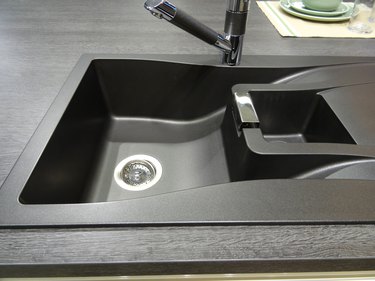
If you've ever stood above a quarry where granite is carved from the earth, you know why it's so popular in kitchens — and why it's so expensive. Granite is heavy and difficult to cut and install. These days, there's an affordable alternative that offers all the visual appeal of the real deal — granite composite. For this dramatic kitchen accent, you'll need to know about granite composite sink cleaners and maintenance to keep your investment looking stunning for years to come.
What Is Granite Composite?
Video of the Day
While granite is "rock hard" and seems indestructible, the natural aspect of granite means that no two pieces are alike and structural inconsistencies can plague every cut of it. It's heavy, expensive and is more prone to chipping than other sink materials, making it harder to keep beautiful in hectic households.
Video of the Day
Granite composite, on the other hand, is comprised of 80 to 95 percent resin and acrylics with 5 to 20 percent real granite, making it engineered to be durable and consistent, and perfect for the usual family kitchen. It's also moldable and can be created in a single piece with no seams, making it easier to seal. Some granite composite sinks, but not all, can resist temperatures of over 500 degrees Fahrenheit and withstand blunt force, so it pays to keep it well maintained for years of functional appeal in your kitchen.
Composite Sink Cleaners & Methods
Homeowners must use pH-neutral cleaners on granite composite sinks, but these do not remove calcium, lime or rust. Unfortunately, commercial products designed to remove these will damage composite sink sealers, so it's critical that you invest in a proper product designed for use in composite sinks. Composite sink retailers and manufacturers can refer you to a product ideal for your sink, just as Supreme Surface refers their customers to specific composite granite cleaners.
For simple daily maintenance, it's much like cleaning a granite sink. Using pH-neutral dish soap and a sponge to wash down and rinse the sink will help keep it looking great — but always wipe it dry after to avoid minerals bonding with the sink after the water evaporates.
Fighting Stains With Vinegar
For stain removal and lime control, a 50-50 solution of vinegar to water is helpful. You can fill the bottom of the sink with a weaker water-vinegar solution and allow it to sit for several hours to "brighten" the sink up and remove stains. Just be sure to rinse it with clean water after, then dry thoroughly. For smaller jobs and more frequent care, put the vinegar solution in a spray bottle and use it for regular cleaning via scrubbing with a stiff but nonabrasive sponge. Again, rinse with water and dry thoroughly each time.
Some recommend sprinkling baking soda on stubborn stains before spraying with vinegar then scrubbing, but this can potentially be abrasive and damage the sealant appearance, so use great caution if you attempt this.
Preventative Tips
You should consult the manufacturer's care recommendations, but some practical tips to keep your sink looking great include:
- Never, ever use abrasive cleaning products or materials in these sinks.
- Homeowners with hard water need to be especially vigilant in drying out the sink after each use. Every time the water evaporates on its own, it leaves behind calcium and lime, which bond to the surface and eventually discolor the product. Avoid this by wiping it dry each time.
- Don't leave wet sponges in it. These can cause discoloration in some sinks or cause limescale and complicate your maintenance needs over time.
- Plastic bowls and strainers are notorious for collecting grit on the bottom. Dragging these over your sink can cause scratches, so be careful to keep the bottoms clean or perhaps use other materials.
- Avoid staining by not allowing red wine, fruit juices, tea, coffee and tomato-based sauces to sit on the composite. Always rinse and dry the sink after exposure to these.